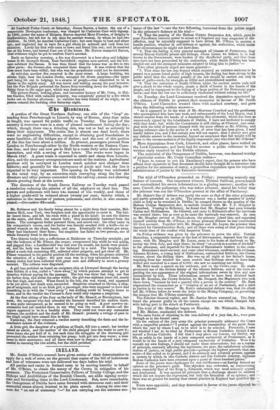be glrobinzes.
A portion of the Great Northern Railway, one side of the "loop" ex- tending from Peterborough to Lincoln by way of Boston, sixty-four miles in length, was opened for public traffic on Tuesday. The people of the country it traverses were in a state of pleased excitement during the day; which, though there was a drizzling rain, was not so bad as seriously to damp their enjoyment. The entire line is almost one dead level; there -were no engineering difficulties, except in obtaining good foundations in some localities-' all the bridges are of timber; and the cost of this portion of the line has been about a million. At present, passengers proceed from London to Peterborough either by the North-western or the Eastern Coun- ties line; and they can now get to Hull by a route forty miles shorter than heretofore, and with a saving of two hours. The works were begun in March 1847. A great trade is expeotsd in cattle and sheep from Lincoln- shire, and the necessary arrangements are made at the stations. Agricultural produce will be conveyed to London much quicker and cheaper than hitherto; and generally for the conveyance of goods and food, the line is expected to be very important. The opening on Tuesday was celebrated in the usual way, by an excursion-train conveying along the line the directors and other persons connected with the railway; rouge and cheering shouts greeting them at the towns.
The directors of the South Devon Railway on Tuesday week passed a resolution reducing the salaries of all the employas on their line. The porters and policemen will have 14s. instead of 15s. weekly, and those of a higher grade -will be reduced about twenty per cant; besides which, a reduction in the number of porters, policemen, and clerks, is also contem- platecL—Devonskire Chronicle.
Mr. Robinson and his family being absent for a night from their mansion, Mel- bourne Hall, near York, two burglars took the opportunity to enter it. The but- ler heard them, and left his room with a pistol in his hand: he met the thieves on the stairs, and fired, but missed both; they immediately hastened from the house. The courageous butler pursued them, and seized one; the other came ti:t his companion's rescue, and the butler was fiercely assailed with a knife—he re- ceived wounds on the chest, hands, and arm. Eventually the robbers got away. They had blackened their faces; but suspicion has fallen on two persons, one of whom formerly lived in the house.
Two thieves broke into a coffeehouse at Maidstone on Thursday sennight; got into the bedroom of Mr. Filmer, the owner; overpowered him while he was asleep, and gagged him: a handkerchief was tied over his mouth, his hands were pinion- ed2 and his body was fastened to the bedstead by a cord. The burglars then seized a cash-box containing 601., collected other property, and got clear offi Mr. Filmer remained in his painful position till the morning, when his groans attracted the attention of a lodger: the poor man was in a very exhausted state. The money stolen had been collected with great care and difficulty to meet a grocery account. The robbers were disguised.
A girl has perished on board an emigrant-ship at Liverpool through the having been hidden in a box, called a "stow-away," by which persons attempt to get to America without paying for the passage. The box was three feet long, one foot six inches deep, and about the same width; the girl was eighteen years old, nearly five feet high, and stoat. When found in the box, she was warm, and appeared to be yet alive; but death soon succeeded. Suspicion attached to Devine, a ship- per of emigrants, and to an Irish girl, a passenger, who were supposed to have had something to do with the " stow-away "; but nothing could be brought home to them, and in the verdict the Coroner's Jury conld only express a suspicion.
At the first sitting of the Jury on the body of Mr. Shuard, at Birmingham, last week, the surgeons who had attended the deceased described his sudden death. It was qaite unexpected, as he seemed to be going on well. A post mortem ex- amination had not enabled them to say what was the cause of death—all the organs appeared to be in a healthy state. They could not trace any connexion between the accident and the death of Mr. Shuard : probably a twinge of pain in the thigh might have caused him to faint.
Yesterday, the Jury returned a verdict merely describing the facts and the in- conclusive nature of the evidence.
A little girl, the daughter of a publican at Neath, fell into a canal; her brother raised an alarm, and the mother of the child plunged into the water to save it: three times she got hold of it, but each time the struggles of the drowning girl prevented the mother from retaining her grasp: both got into deep water; a man came to their assistance; and all three were now in danger: a second man sue- needed in rescuing the two adults, but the child perished.


























 Previous page
Previous page